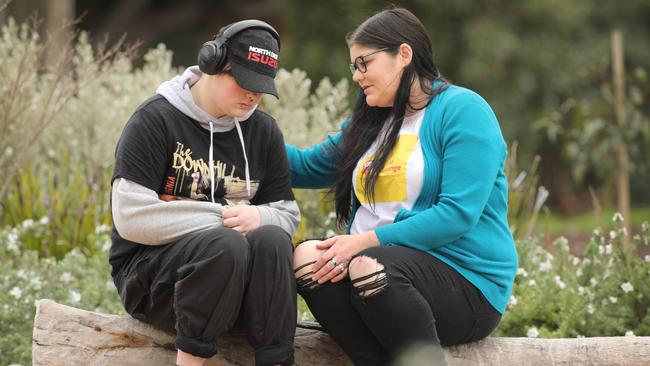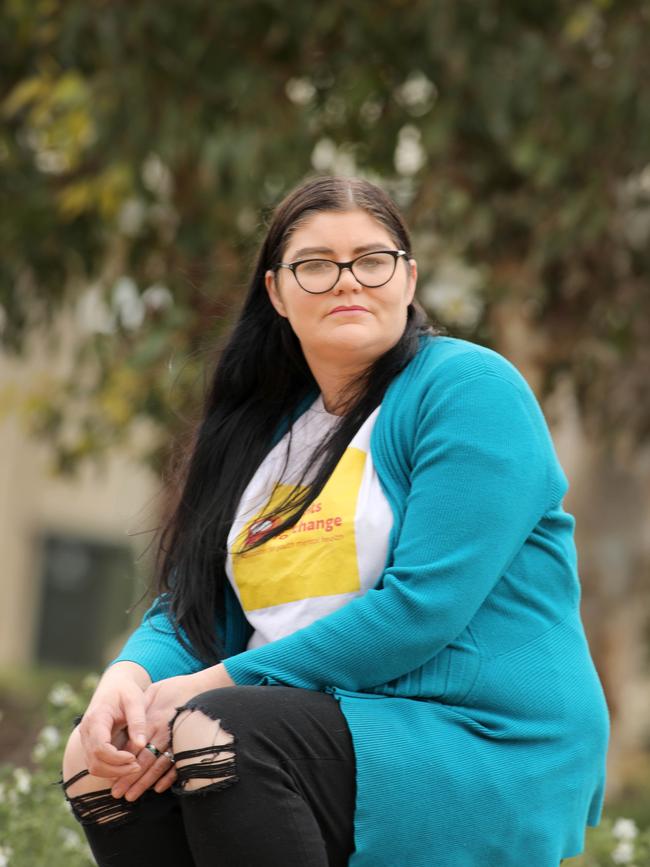Suicidal teen Zayah went to the WCH more than 200 times, and made an attempt on their life straight after one visit, prompting calls for reform
An Adelaide teen who went to the Women’s and Children’s Hospital more than 200 times for mental health help tried to take their life immediately after one visit.

SA News
Don't miss out on the headlines from SA News. Followed categories will be added to My News.
Zayah is a suicide survivor.
Yet to celebrate their 18th birthday, Zayah has presented to the Women’s and Children’s Hospital (WCH) more than 200 times, on one occasion attempting to take their own life within minutes of leaving the CBD hospital grounds.
While wiping away tears, Zayah’s mother, Melissa Kingston-Lee, said arriving at the hospital was one of the worst moments of her life.
“Zayah was hooked up to a lot of machines … they were just crying and said “Help me Mum, it hurts.”
Zayah is still suffering from injuries sustained during their suicide attempts, but in recent months has shown promising progress in their journey to recovery.
Ms Kingston-Lee has shared Zayah’s story in the hope of sparking changes in South Australia’s youth mental health system.
In December 2021, Zayah made an attempt on their own life after walking out of the WCH.
The incident happened immediately after Zayah had attended the hospital for mental health concerns.
“Zayah was able to walk right out, unaccompanied,” Ms Kingston-Lee said.
“They were laying on the road alone until the ambulance arrived.”
Zayah suffered multiple pelvic fractures and a serious abdominal wound, requiring three surgeries and a three week stay at the Royal Adelaide Hospital.

At the time, Ms Kingston-Lee expressed her shock and disbelief to the doctors.
“I remember saying, you have really let us down, how did this happen? How was a young person threatening suicide allowed to walk out?” she said.
“And I know nothing has changed because Zayah has been able to leave the WCH unaccompanied multiple times after that incident.”
Zayah is one of five children and a member of the LGBTQIA+ community.
Growing up in Adelaide’s northern suburbs, Zayah enjoyed playing basketball and rugby and also developed a talent for art.
As a teen, Zayah’s interests shifted to skateboarding and gaming, but they held onto their artistic flair, combining two passions to create skateboard art.
Zayah has a close relationship with their mother and grandmother, but in recent years has shared a particular bond with their five-year-old cousin, Jackson.
“The pair love to play Minecraft on the Xbox,” Ms Kingston-Lee said.
“Zayah really looks forward to it, Jackson lifts their spirits.”
Ms Kingston-Lee first became concerned for Zayah’s welfare when they were 14-years-old.
“It was hard to tell, but I saw Zayah was self-harming and tried to ask about it, they just shut down,” Ms Kingston-Lee said.
Zayah’s mental health took a turn for the worst when they began to spend time with a school friend who was struggling with similar issues.
“Things really escalated from here … Zayah was getting a lot of ideas,” Ms Kingston-Lee said.
Zayah began to sneak out during the night and the police would find them threatening suicide.
“I think when someone has friends with similar mental health concerns they can be a negative influence on each other, even without meaning to,” Ms Kingston-Lee said.
Of about 200 presentations, Zayah was admitted to a mental health ward at the WCH on only three occasions.
“I begged the hospital, I said I can’t keep Zayah safe at home 24 hours a day,” Ms Kingston Lee said.
“At that point I was told that if I didn’t pick Zayah up I would be charged with child abandonment and they would be placed into state care.
“Zayah had to voluntarily want to stay there.”
Ms Kingston-Lee believes the state’s youth mental health system needs urgent reform, starting with the WCH.
“We need more inpatient beds at the WCH,” Ms Kingston-Lee said.
“But we also need more inpatient treatment … a longer term solution.”
Ms Kingston-Lee thinks a ‘step-up, step-down’ model would provide viable support for youth experiencing mental health concerns.
“Adults have three tiers of support for varying risk levels in the northern suburbs alone,” she said.
“Why not apply that model to youth mental health intervention as well?”.
Zayah has since been diagnosed with autism and borderline personality disorder.
Ms Kingston-Lee said the diagnoses “were a significant piece of the puzzle” and will allow Zayah’s treatment to be more effective.
“Being young and not having the coping skills makes it so difficult,” she said.
“But Zayah is slowly improving … a year ago Zayah would blow up at things that seemed minor, leave the house and end up at the hospital. Now they might shut themselves in their room and speak to a friend.
Zayah has not presented to the WCH in four months and seeks professional support.
“Their circle of friends has also changed and I think that has made all the difference,” Ms Kingston-Lee said.
Zayah is also enrolled in the Wirreanda Adaptive Vocational Education (WAVE) program at Wirreanda Secondary School.
The program is an alternative pathway for students who have disengaged from mainstream schooling and takes a more individualised approach to learning.
Zayah’s case worker works with them to develop goals for the future and provide personal support.
“There’s a long road ahead,” Ms Kingston-Lee said.
“I worry all the time, but I’m hopeful for the future.”
Queer community is at a greater risk
Lauren Thomas-Nehmy
Cemented societal beliefs are contributing to the increased mental ill-health of young LGBTIQ+ Australians.
A 2021 snapshot published by the LGBTIQ+ Health Australia revealed a disproportionate number of people who identify as lesbian, gay, bisexual, transgender, queer or otherwise sexually, bodily or gender diverse, are at higher risk of experiencing poorer mental health outcomes and suicidal behaviours.
When compared to the general population, LGBTIQ+ people aged 16 to 17 were almost three times more likely to have attempted suicide in the past 12 months and almost five times more likely to have attempted suicide in their lifetime.
The snapshot concluded the statistics are a direct reflection of stigma, prejudice, discrimination and abuse experienced by the LGBTIQ+ community.
Beyond Blue lead clinical adviser Grant Blashki shared similar views, but understands there to be additional factors responsible for the data.
“For a lot of these young people, coming to terms with their identity is not always straightforward and there can be a lot of internal worry and angst,” he said.
“There are also macro issues which impact young people’s lives, such as poverty, educational disadvantage and people who are in abusive or violent environments.
“Life is hard enough without feeling like you’re riding your bike against the wind the whole time.”
Mr Blashki, who also practises as a GP in Victoria, believes the country’s mental health system has a “long way to go”.
“There are government level societal issues that we need to keep working on … but we also need to think about how to strengthen the workforce and increase access to high-quality care.”
More Coverage
Originally published as Suicidal teen Zayah went to the WCH more than 200 times, and made an attempt on their life straight after one visit, prompting calls for reform




